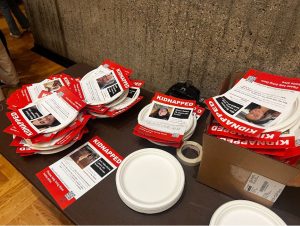On Friday, Nov. 3, around 100 students and Amherst community members gathered in the University of Massachusetts Campus Center to honor and spotlight the estimated 240 hostages that were taken by the Hamas militant organization during their attack on Israel’s border.
The event, titled “Bring Them Home: Solidarity Walk and Installation,” was organized by UMass Hillel.
The event began in the Campus Center auditorium where participants made signs and taped posters of kidnapped individuals from Israel to paper plates. The group then walked through campus, many participants adorning Israel’s flag on their backs or waving it in the air. The group eventually arrived at the campus pond lawn; six long tables were set up with 240 empty seats to represent the hostages taken by Hamas. The participants were instructed to place a plate in one of the empty spots.

Rebekah Steinfeld, assistant director of Hillel, said they were inspired by other campus communities who have set up similar displays.
“Hillel is here to support Jewish students and I think we’ve been struggling to figure out how to make a statement and make Jewish people feel like they are not alone,” she said. “We didn’t want to do something aggressive or loud, but we wanted to make a statement.”
The event coincided with the start of the Shabbat holiday, or the Jewish Day of Rest, which takes place every Friday sunset to Saturday sunset. The display was meant to represent a Shabbat dinner table, as Hillel wanted to honor the missing people who are not able to spend the holiday with their family.
Ben, a UMass student from Israel, had an Israeli flag around his shoulders and observed the rows of tables.
“I’ve had friends and close ones die from what happened back on October 7. People I knew from high school, friends of my friends, family friends,” he said. “There’s been a lot of support from people, from Hillel especially, you know, it’s a sad thing. It’s a sad truth that tragedy brings people together, but it is true.”
Edith Mor, an Israeli and Hadley resident, knows people who were taken hostage by Hamas.
“We’re here to put pressure to bring them home,” Mor said.
For many Jewish students, finding community within UMass has aided in coping with shared loss.
“For myself, it’s been finding close friends, just sharing my own experiences,” Simona Zilberberg, a senior computer science major who has family in Israel, said. “But it’s really hard, like, social media. Every day I go on there you see antisemitism, hate and it’s almost unavoidable even in my classroom. So I’m really proud of our community who can come out here and stand for our beliefs but in a peaceful way.”
Ina Porth, an Amherst resident, also expressed having to take a break from the media. “[The media] is so anti anti-Israel when you know, we’re not talking about one versus another. We can be pro-Palestinian anti-Hamas at the same time. And that’s what we are.”
“We are here supporting Israel and all of our relatives and family and friends that are living there and fighting the war there and praying for the return of hostages,” Ariel Girshik, a sophomore marketing major, said. “I feel like there haven’t been much said [by the University] we could feel a little more supported.”
Lisa Perlbinder, a longtime Amherst community member and former University employee said she attended the event to show support for the Jewish community at UMass. “I want to show support for students who are facing potential violence and antisemitism,” she said. “I want to show everyone else that we have a voice.”
Aliyah Mekuria Miller, a political science major, who recently returned from a Birthright trip and living in Israel for a year, said she feels “since the war started Hillel has been really quiet” so she was happy to see them putting on an event.
After the tables were set, Rabbi Aaron Fine, the executive director of Hillel, said a few words to the crowd. “It’s not an easy time to be a Jew or Israeli in the world, or on campus either,” he said. Fine emphasized that “many of us have family and friends directly in harm’s way,” and that this conflict is not theoretical or abstract for the Jewish community at UMass.

Fine ended the event by leading the group in Shalom Aleichem, a traditional song sung on Friday nights to signal the arrival of Shabbat.
The Amherst community expressed various perspectives on UMass’ role in providing outreach and a safe space to the Jewish community.
Karen Loeb, an Amherst community member, expressed her disappointment in the University’s response to the Oct. 7 attack and in the actions of UMass students.
“I think they should have come out right away, strongly condemning what Hamas did. They didn’t and I’m very disappointed in them for that,” Loeb said. “I’m very disappointed in the campus students, that they only see things one way, that they refuse to see that this is a very complicated situation” … “It’s absolutely horrifying to me.”
Since Hamas’ attack on Oct. 7 that resulted in over 1,400 Israeli deaths of mainly civilians, Israel has retaliated with a bombardment and siege of the Gaza strip. On Oct. 28, Israeli Prime Minister Benjamin Netanyahu claimed to begin launching a second phase of the war, involving ground operations against Hamas. The Palestinian death toll has surpassed 9,000, according to AP News. The tensions are part of a longstanding conflict.
In Hillel’s Jewish Communal Statement, they call upon the campus community to “raise up the ideals of civil discourse, education, and relationship and bridge-building…in this time of high tension and emotion.”
Grace Lee can be reached at [email protected]. Jack Underhill can be reached at [email protected] and followed on Twitter @JackUnderhill16





















